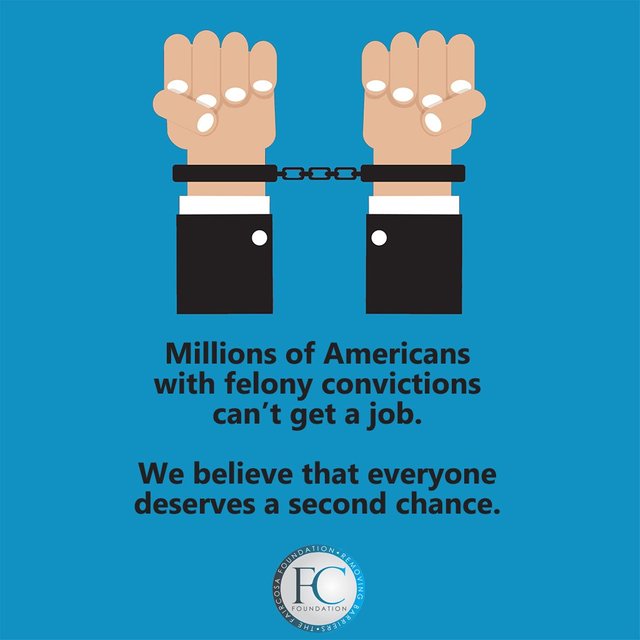Everyone Deserves a Second Chance and a Job
The FairCosa Foundation

Mission
from historically underprivileged communities
to aid in improving quality of life through
education, training, and community development.
Approximately 8 percent of all Americans have a felony record (Shannon et. al, 2017). In order to re-enter society successfully, these people require a job, dependable transportation and a place to live. Unfortunately, it’s not easy. Many potential employers ask job candidates to specify a felony record on the application. Only 11 states passed “Ban the Box” laws that prohibit this question: California, Connecticut, Hawaii, Illinois, Massachusetts, Minnesota, New Jersey, Oregon, Rhode Island, Vermont and Washington. Here in Ohio, the box often means that a felon, trying to create a new life as a responsible citizen, loses the job.
So how does a person re-enter life successfully? According to Matthew Fairfield, founder and president of the FairCosa Foundation, “get job-based training, especially in a field that pays a living wage, and try to get it when you’re still inside.”
The FairCosa Foundation trains candidates to become transportation industry brokers or dispatchers, at first while incarcerated and later in a foundation-based home. “Because we provide training where participants live, transportation issues are lessened. After about a year, graduates of the program can get a job with our partner, Coast 2 Coast Logistics, LLC, or work for another brokerage.”
According to Fairfield, employers in the transportation industry rarely prohibit felons from jobs. “Labor shortages lead to jobs with good pay. More truck driver jobs exist than good drivers. Companies need more trained brokers and dispatchers too.
The FairCosa Foundation’s training program for participants in the Grafton Correctional Institution begins in June 2019. The Foundation partners with correctional institutions and the Ohio Department of Corrections. The FairCosa Foundation celebrates Second Chances Month this April.
 We all deserve a future - help us clear the way.
We all deserve a future - help us clear the way.

The FairCosa Foundation
email: [email protected]
On Facebook @faircosafoundation 
On Twitter @ faircosa
and to the #powerhousecreatives for their awesome
community support. All proceeds from this post go toward supporting The FairCosa Foundation.

Congratulations! This post has been upvoted from the communal account, @minnowsupport, by mattifer from the Minnow Support Project. It's a witness project run by aggroed, ausbitbank, teamsteem, someguy123, neoxian, followbtcnews, and netuoso. The goal is to help Steemit grow by supporting Minnows. Please find us at the Peace, Abundance, and Liberty Network (PALnet) Discord Channel. It's a completely public and open space to all members of the Steemit community who voluntarily choose to be there.
If you would like to delegate to the Minnow Support Project you can do so by clicking on the following links: 50SP, 100SP, 250SP, 500SP, 1000SP, 5000SP.
Be sure to leave at least 50SP undelegated on your account.
As I understand 1 out of 4 Americans end up in prison. So 1 out of 4 is in prison, 1 out of 4 perhaps left and on the way back into prison (I write since years with several of them) which means the 8% is not true and the percentage is at least 25% but closer to 50%.
Since many have jobs in prison as well and they are not all child molesters and serial killers or thieves they should be put at work and not forced into a world that brings them back in jail.
Many are there already for a reason they would never be convicted for in other countries.
Posted using Partiko Android
I agree with the vast majority of what you said. The statistic I sited is mentioned and discussed here but comes from a more scholarly article which I have been unable to access the full text to.
The study was based on data up to 2010, so it's a bit outdated, but as discussed in the linked article, more recent reliable stats are pretty hard to find. The 8% referenced includes all Americans with felony convictions, even those who served their sentence without going to prison.
Here's another interesting article from the Bureau of Justice Statistics which discusses an American's likelihood of being incarcerated at some point in their lives. If you are black, your odds are about 28.5% according to the study, while a white person only has a 4.4% chance. This study provides an overall chance of 5.1% that you will go to prison, but breaks it down ever further by race and gender. As a woman in her mid-thirties, I only have a .8% chance of going to prison.
So while your number of 1 in 4 is accurate for one demographic, it doesn't hold if you average the population as a whole. That in itself is incredibly alarming and demonstrates how skewed the laws and application of law is here in this country.
Thank you so much for commenting. Are you from the US or elsewhere? I'm curious which laws you see as being punished differently.
No, I am Dutch. Smoking or having cannabis is allowed in the Netherlands and you will not end up in prison for it. Also, small chance you will if you have sex with a minor (16 years old and up).
In Holland, you can be a serial killer and they give you 8 times a new identity and you not end up in prison, you can beat your wife up, drag her behind your car through the streets and set her at fire and the police won't show up unless... you are white.
Posted using Partiko Android
The drug laws here are certainly some of the most discriminatory laws that we've got.
I'd never heard that convicted killers can get a new identity. Can you send me a link with more information? To me, that sounds insane - but perhaps there is more logic to it than I realize.
And are you saying that white people have more leeway or less leeway in Holland?
Yes. everyone do deserve a second chance but, it takes awhile for people to trust you again especially when you had been convicted for such a crime.
For me, I wanted to sit in the middle: people do deserve to be given a second chance but, they do also need to prove that they deserve to be trusted anew.
Yes, I agree with that as well.
One unique feature of our program is that we begin the training while participants are still incarcerated. We have pretty strict guidelines that they have to abide by. It's easy to get yourself dropped from the program if you haven't demonstrated that you are willing to work hard.
Once released, participants are still under both court supervision and our program supervision. Their internship lasts for an entire year - that's plenty of time for people to weed themselves out.
When we recommend a Restored Citizen to our business partners as a potential employee, we are able to do so with full confidence that they will be a great asset to the team.
Thanks for dropping by and commenting. I think our program also sits in the middle, like you. :-)
This is a very important foundation. I have to wonder at the stupidity (sorry, but that does seem to be the proper word here) of those who would create laws the incarcerate people, then ensure that once they have (supposedly) paid their debt, essentially increase the likelihood that they will have to steal to make ends meet. I'm originally from Ohio, but with the laws that they have and the recent anti-abortion heartbeat law, I'm really glad I don't live there anymore. Unfortunately, I live in Texas, which is not exactly the most progressive state (that's an understatement). Your list of states that actually have passed laws to help former felons is a good start at helping me look for another state to move to. In any case, I really appreciate what you are doing to bring attention to this issue.
Proud member of #powerhousecreatives
It's a vicious cycle, that's for sure. A lot of the violations that cause people to go back to prison are things largely beyond their control - for example, a stipulation of release is often finding suitable housing within a certain timeframe. After being incarcerated for a few years, most people come out with a terrible credit score. When they try to rent a place, many landlords look at credit scores to determine if a person is an acceptable risk. Now they can't find a place to live, and the judge can send them back to prison for it.
It's twisted.
Texas certainly doesn't have the best reputation as far as the legal system goes either. I'm glad the list is helpful to you. :-)
I'm not assuming you are a felon, but here is a link to the most felon friendly states in the US. I would think those states might be more friendly in other ways as well.